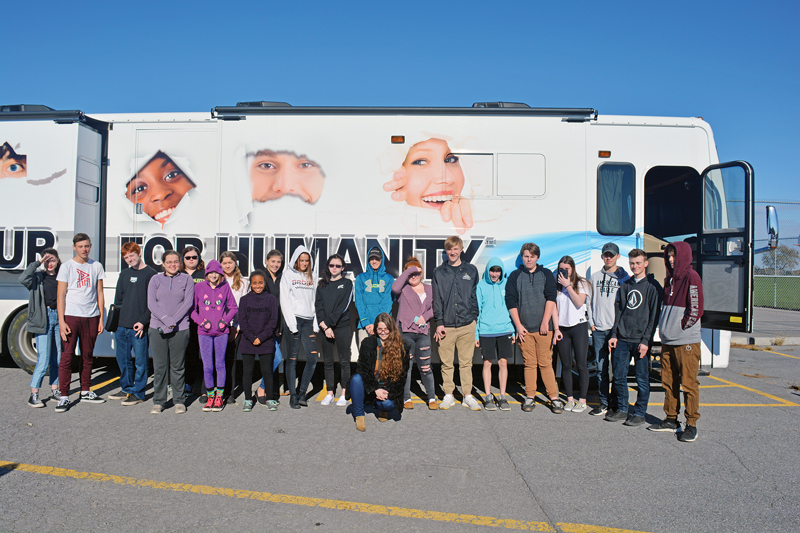Students of North Dundas District High School were educated about some of history’s worst genocides from Josef Stalin’s reign to Hitler’s influence during the holocaust. Up to 30 students were able to fit on the bus to watch the presentation. Glover photo
Kory Glover
Record Staff
CHESTERVILLE – Too many high school students have their eyes glued to their phone when a history lesson presents itself in front of them.
However, little do they know, the more you learn about the horrors of yesteryear, the less likely you are to repeat them.
Elena Kingsbury, education associate for Friends of Simon Wiesenthal Centre for Holocaust Studies (FSWCHS), shared an important historical lesson for students of North Dundas District High School (NDDHS) involving genocide, dictators and tragedy.
“The Tour for Humanity is our mobile educational facility that’s run by the FSWCHS. We’re a human rights organization and we are stationed out of Toronto but the tour allows us to travel all over Ontario and talk with students from all sorts of different communities,” said Kingsbury. “We talk about many different issues, but the holocaust is the foundation of what we do. From there, we also talk about Canadian history, other genocides, and we also discuss bullying; just some pieces for other students.”
Kingsbury doesn’t hold back in her presentation, educating students in-depth about some of history’s greatest tragedies. Unfortunately, not too in-depth as each class only gets one hour.
“We try to go into as much depth as possible but we’re limited in a sense that each group only gets one hour each,” she said. “But at our centre, we do more in-depth programs and we also have holocaust survivors speak to students to understand what horrors they endured. We really want to make sure that students understand the rise of Nazism, the significance of Hitler, his supporters, how that affected Jewish people and other victims of the holocaust.”
Kingsbury believes that a lot of ideologies that existed during the times of the holocaust aren’t exactly in the past and she hopes that students will learn more about the dangers of extremists groups, interpret what they stand for and realize the consequences of hate.
“We see today that there are still Neo-Nazi groups and other extremists that are emboldened in this age and we think it’s really relevant to keep talking about the Nazis,” she said. “It’s also important to keep talking about victims during the holocaust too because people with disabilities were also murdered, people of other ethnic backgrounds and even communists and fascists were targeted because they were seen as enemy ideologies.”
Reporter/Photographer for Chesterville Record and Eastern Ontario Agrinews. Currently working on Record segment, “Chilling Tales from Beyond”









